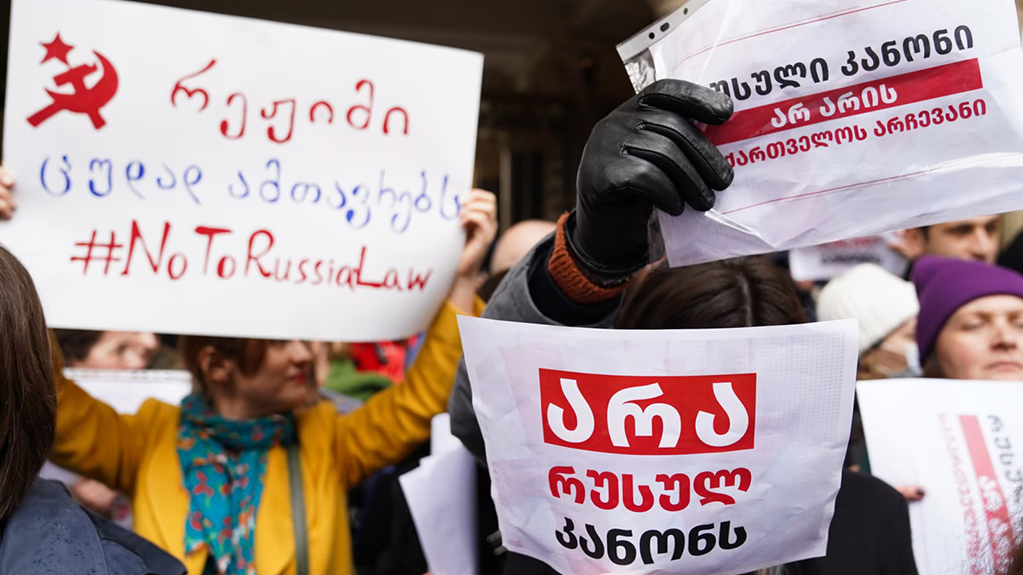Representatives of international organizations, and European, and American politicians criticize the ruling Georgian Dream for reintroducing the so-called Russian law about Agents viewing it as sabotage of the country's European future.
News
Senator James Risch, the ranking member of the US Senate Foreign Relations Committee, and Jeanne Shaheen, chairman of the Subcommittee on European Cooperation and Regional Security, released a statement that says that the Georgian government's revival of the Agents' law is "incredibly disheartening".
“It is similar to laws Russia uses to restrict civil society and suppress political opposition. A democratic government in Georgia should have no reason for it.
“The Georgian people rejected this proposed law via mass demonstrations in March 2023. Not only would this draft law lead the political process in the wrong direction, but it would harm Georgia’s transatlantic integration and its future in the European Union. The upcoming elections in October will be a crucial indicator for Georgia’s democratic future. We strongly urge the Georgian parliament to reject this proposal,” - The senators state and add that the parliamentary elections scheduled for October will be a decisive indicator for the democratic future of Georgia.
Sonja Schiffers, head of the South Caucasus region of the Heinrich Boll Foundation, responded to the statement issued by Georgian Dream on April 3 and assessed the announced law as an attack on donors supporting Georgia.
“An incredibly disdainful text justifying reintroducing the "foreign agent law" in Georgia, rebranded as law on "organizations pursuing the interests of a foreign power." An attack not only on civil society but all donors working to support Georgia for decades,” - Wrote Schiffers on X.
“It is very unfortunate that the ruling party is trying to divide the people before the elections, is trying to exert pressure and undermine what has already been achieved and appreciated by granting the candidate status,” - Says the member of the European Parliament, Anna Fotyga
German MEP Viola von Cramon writes that the Georgian Dream “got new instructions from their masters in the Kremlin.”
“They are so uncreative that they reintroduced the same Russian law that Georgian people said NO to. This law has one goal - to sabotage Georgia's European future. To keep Georgia in the Russian swamp. Bad idea.”
European parliamentarian Miriam Lexmann also assessed the law as a declaration of sabotage for the European future: "The Georgian Dream tried its best to turn off scrutiny of its actions, but they can’t cancel the truth. The GD government once again proves that it is willing to sabotage Georgia’s European reform path.”
Former European parliamentarian Rebecca Harms also expressed her opinion and called the law an import from the Russian dictatorship: "Georgian Dream or Nightmare? The foreign-agent-law is an import from the Russian dictatorship and would poison all democratic processes as well as EU integration.”
Lithuanian MEP Petras Austrevicius also wrote on X that it Looks like the ruling party of Georgia is turning towards Euro Asian tyranny and democratic criteria cannot be a matter of negotiation. "We don't need a second Hungary in the EU," he said in his comments to the media.
Lithuanian diplomat and member of the Seimas Zygimantas Pavilionis also responded to the processes and noted that the initiative is a "Dangerous demonstration of pro-Russian, pro-Chinese tendencies within Georgian Dream”.
I hope this autocratic, anti-Western initiative will be stopped," Pavilionis wrote.
Laura Thornton, former head of the Georgia office of the National Democratic Institute and senior vice president of the German Marshall Fund, says that reintroducing the Russian law is "an old tactic of regimes to limit civil society before elections."
"These laws, wrapped in the term 'transparency,' aim to remove critical checks on the government. I've seen it many times, in many places, and it's important to call it what it is - Russian law," says Thornton.
The ruling party intends to pass the law on so-called foreign agents in all three readings by the end of the current session of parliament, which was rejected in March 2023 due to protests and international pressure. The text of the draft law will remain the same, with only "agent of foreign influence" being replaced by the term "organization carrying the interests of a foreign power." At today's briefing, the executive secretary of the ruling party, Mamuka Mdinaradze, noted that the draft law would not be considered in an accelerated manner and would not be withdrawn even in the event of a larger protest than last year. "No way. This is a matter of principle," said Mdinaradze. Until now, the leaders of Georgian Dream had declared that they would not return to the draft law and that this issue was closed. The honorary chairman of the party, Bidzina Ivanishvili, supports the re-initiation of Russian law.















